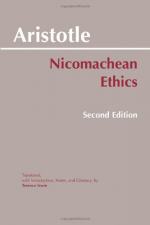
|
| Name: _________________________ | Period: ___________________ |
This test consists of 15 multiple choice questions and 5 short answer questions.
Multiple Choice Questions
1. In how many ways does Aristotle speak of the mean in II.6?
(a) Four.
(b) Three.
(c) One.
(d) Two.
2. What vice is, according to Aristotle, in deficiency of the virtue of courage?
(a) Gluttony.
(b) Cowardice.
(c) Sloth.
(d) Rashness.
3. With what is V.10 concerned?
(a) The equitable.
(b) The aristocracy.
(c) The distributable.
(d) The oligarchy.
4. What did the Pythagoreans say is simply just?
(a) Virtue.
(b) Reciprocity.
(c) Distribution.
(d) Equity.
5. Who is the worst person in the community in Aristotle's judgment?
(a) One who uses vice in relation strictly to others.
(b) One who uses vice in relation to himself alone.
(c) One who uses virtue in relation to himself and ignores others.
(d) One who uses vice in relation to himself and others.
6. How many types of virtue does Aristotle claim exist at the beginning of Book II?
(a) Three.
(b) One.
(c) Two.
(d) Seven.
7. What two things does Aristotle define as contraries in II.8?
(a) The median and the mean.
(b) Vice and virtue.
(c) The excess and deficiency.
(d) The extremes and the mean.
8. Aristotle says that the magnanimous man cares more for what than for people's opinions?
(a) Respect.
(b) Fame.
(c) Money.
(d) Truth.
9. How many virtues does magnanimity require, for Aristotle, in order to be in a person?
(a) All of them.
(b) None of them.
(c) Three of them.
(d) Most of them.
10. What is the literal prize for boxers, according to Aristotle in III.9?
(a) A seat in the senate.
(b) A golden medal.
(c) A crown of leaves.
(d) A lordship.
11. In how many ways are things called courage according to Aristotle in Book Three?
(a) Ten.
(b) Six.
(c) Five.
(d) One.
12. Which of the following does Aristotle not list as a feeling that comes to be present in the soul?
(a) Longing.
(b) Knowledge.
(c) Fear.
(d) Joy.
13. In addition to the life of pleasure and the life of politics, what is the third sort of life that Aristotle mentions?
(a) The life of rebellion.
(b) The life of servitude.
(c) The hermetical life.
(d) The contemplative life.
14. The attainment of serious moral stature is described by Aristotle in II.9 as being what?
(a) Impractical.
(b) Almost impossible.
(c) Hard work.
(d) Natural.
15. By human excellence, Aristotle means what?
(a) That which belongs to the body.
(b) That which belongs to mankind.
(c) That which belongs to the individual.
(d) That which belongs to the soul.
Short Answer Questions
1. For the sake of what does Aristotle state the courageous person endures the fearful?
2. What is demonstrated, in Aristotle's perspective, by the person who calmly bears misfortunes and sufferings?
3. Aristotle states that one suffers injustice willingly in what situation?
4. By doing what, in the opinion of Aristotle, does man make himself a certain sort of person?
5. With what two conditions is courage principally concerned, according to Aristotle?
|
This section contains 465 words (approx. 2 pages at 300 words per page) |

|




